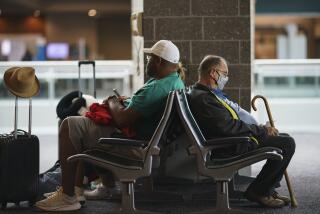On Airplanes, Don’t Be a Bellyacher
- Share via
If you’re like many airline passengers, you start chewing gum to ease ear discomfort at the start of your flight, and you accept the carbonated soft drink that the flight attendant offers.
You’ve just set yourself up for gastrointestinal distress.
Despite the tendency to criticize airline food for stomach discomfort, travelers’ habits also may be contributors.
When it comes to gastrointestinal problems, “several factors conspire against you when you are on a plane,” says Dr. Maria T. Abreu, a gastroenterologist and assistant director of the Inflammatory Bowel Disease Center at Cedars-Sinai Medical Center.
Soft drinks and chewing gum increase the production of gas in the digestive tract, she notes. Soft drinks do so because of the carbonation; chewing gum increases the amount of air swallowed.
But most people consider it unacceptable to belch or pass gas in public, especially in close quarters. “So you have to hold it, and you are more uncomfortable,” she says.
If you fasten your seat belt too tightly, Abreu adds, you can set yourself up for acid reflux, in which acid works its way up the esophagus and causes heartburn.
Altitude also plays a role in the discomfort, says Dr. Wally Ghurabi, chief of emergency service at Santa Monica-UCLA Medical Center.
Abreu adds, “Whatever gas you consume is going to be expanded, once in your intestines, due to altitude.”
Among measures to take to minimize such problems aloft:
* During the holidays, skip the peppermint candies, Abreu says, especially if you’re prone to heartburn. The peppermint, she says, reduces the muscle tone of the lower esophageal sphincter, a group of muscles that usually tightens to protect the esophagus from stomach acid back flow.
If you’re lactose intolerant, avoid milk and other dairy products, which can also lead to excess gas production.
* Drink plain water or juice. Avoid carbonated beverages, chewing gum and hard candies, which can lead to the need to belch. Choose apple juice instead of orange, because orange juice tends to upset the stomach more than other juices, Ghurabi says.
* Try to move around, Ghurabi adds. That will speed digestion of whatever you eat aloft. Better yet, he says, “Try to have a meal before boarding, and stick with fluids on the plane, if possible.”
* If you do eat aloft, avoid gas-producing foods, including broccoli, cabbage, cauliflower and baked beans, suggests the American College of Gastroenterology. Certain starches, including wheat, oats, corn and potatoes, also are likely to form gas. Rice is a better option if you’re interested in minimizing gas production.
“Eat only foods that are cooked well,” advises Jean Olds Weese, a professor of food science and nutrition at Auburn University in Alabama. “Raw vegetables will tend to give you more gas. And spicy foods cause gastric distress in some people.”
* Eat slowly; eating or drinking too quickly can lead to excessive belching or embarrassing hiccups.
* Try to stay calm. Excessive swallowing brought on by nervous tension can lead to belching, too.
* Finally, get an aisle seat so you’ll have easier access to the toilet if you need it.
Healthy Traveler appears on the second and fourth Sundays of the month. Kathleen Doheny can be reached at kdoheny@compuserve.com.
More to Read
Sign up for The Wild
We’ll help you find the best places to hike, bike and run, as well as the perfect silent spots for meditation and yoga.
You may occasionally receive promotional content from the Los Angeles Times.






